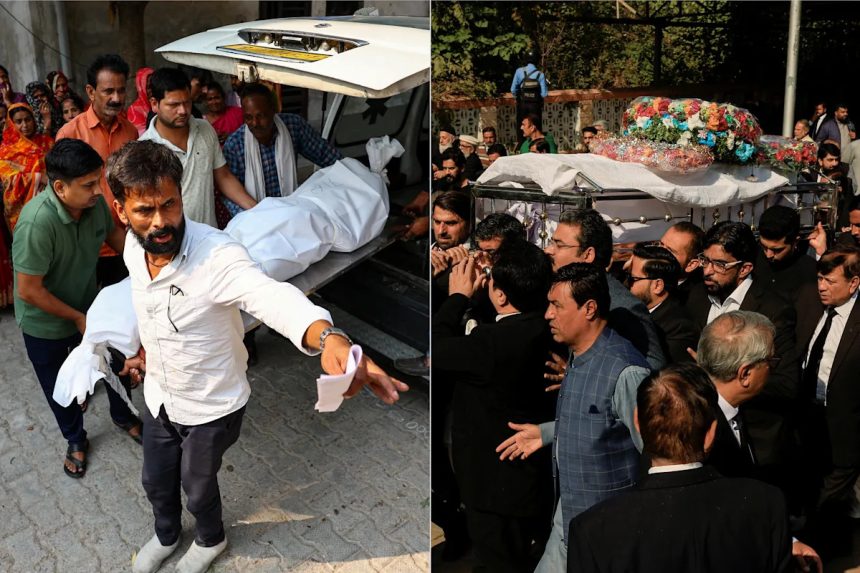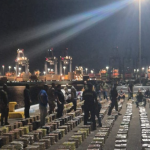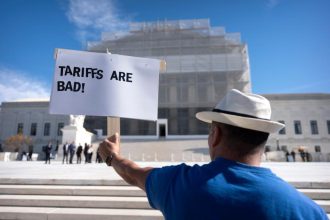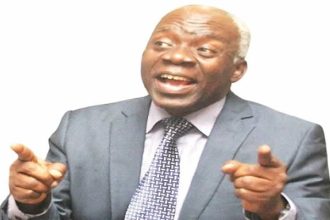A day after a bomb blast in Pakistan’s capital, Islamabad, and two days after a similar explosion in India’s capital, New Delhi, tensions in South Asia have heightened. A blame game has intensified between the neighbours who are still reeling from a brief but intense conflict just six months ago.
Here is more about what happened in Islamabad and Delhi, and what Pakistani and Indian officials are saying about the attacks.
What happened in Delhi?
At 6:52pm (13:22 GMT) on Monday, a powerful explosion tore through Delhi, in a densely populated area near the Red Fort Metro Station. At least 13 people were killed and more than 20 people were wounded.
“A slow-moving vehicle stopped at a red light. An explosion happened in that vehicle, and due to the explosion, nearby vehicles were also damaged,” Delhi Police Commissioner Satish Golcha told reporters.
Who has India blamed for it?
While India has not officially blamed anyone, Delhi Police have invoked India’s primary “counterterrorism” law, the Unlawful Activities (Prevention) Act, or UAPA, of 1967.
Police detained the original owner of the vehicle in which the explosion took place. The owner was identified as Mohammad Salman in the city of Gurugram in Haryana state on Delhi’s outskirts. Salman had purchased the vehicle in 2013.
Investigators revealed that Salman sold the vehicle to a man in New Delhi, who later resold it. The man who Salman sold the vehicle to has also been arrested. Despite the sales, the car remained registered in Salman’s name and bore a Haryana number plate, according to local media reports.
During a scheduled trip to the Bhutanese capital Thimpu, India’s Prime Minister Narendra Modi said: “Today, I have come to Bhutan with a very heavy heart. The horrific incident that happened in Delhi last evening has deeply disturbed everyone.”
Modi added: “Our agencies will get to the very bottom of this conspiracy. The conspirators behind this will not be spared. All those responsible will be brought to justice.”
Indian Defence Minister Rajnath Singh also said that investigative agencies are conducting a “swift and thorough” inquiry into the blast.
But despite these statements, Indian leaders and security officials have so far not formally named any individual or group as responsible for the explosion.
How has Pakistan responded to India?
New Delhi has also, so far, not accused Pakistan of being behind the attack.
But Pakistani officials have said that they expect India to blame Pakistan for the attack in Delhi.
While speaking to local media, Pakistani Defence Minister Khawaja Asif said, referring to the attack in Delhi: “I won’t be surprised if in the next few hours or tomorrow India blames us for this.”
What happened in Islamabad?
Less than 24 hours after the attack in Delhi, around 12:30pm (07:30 GMT) on Tuesday, an explosion took place at the entrance of the District Judicial Complex on Srinagar Highway in Islamabad.
Pakistani Interior Minister Mohsin Naqvi said to reporters that a “suicide bomber” detonated explosives near a police vehicle outside the gates of the court.
Naqvi added that the perpetrator tried to “enter the court premises but, failing to do so, targeted a police vehicle.”
The minister said that at least 12 people were killed in the attack in Islamabad and more than 30 were wounded, with at least five in critical condition.
The Jamaa-ul-Ahrar, which is a splinter faction of the Pakistan Taliban (Tehreek-e-Taliban Pakistan or TTP) armed group, has claimed responsibility for the attack. But the TTP, which ideologically aligns with the Afghan Taliban, has denied its involvement in the attack.
Pakistani President Asif Ali Zardari said that he “strongly condemned the suicide blast”.
Who has Pakistan blamed for it?
Pakistani PM Shehbaz Sharif has blamed “Indian proxies” for the attack on Islamabad, without providing evidence.
In a statement, Sharif said: “Terrorist attacks on unarmed citizens of Pakistan by India’s terrorist proxies are condemnable.”
A day before the Islamabad attack, a car packed with explosives crashed into the campus entrance in district capital Wana. Security forces report that at least 300 cadets have been rescued, and operations to free the rest are still under way. Sharif has also blamed India for this attack.
“Both attacks are the worst examples of Indian state terrorism in the region. It is time for the world to condemn such nefarious conspiracies of India,” Sharif said.
Pakistani Defence Minister Khawaja Asif claimed that the attack in Islamabad was planned from Afghanistan, at India’s behest. Relations between Pakistan and Taliban-ruled Afghanistan have been deteriorating for years, hitting a new peak of tension in October following a series of border clashes.
During the clashes, which began in early October, 50 civilians were killed and 447 were injured on the Afghan side of the border, according to the United Nations. At least five people were killed in the Afghan capital, Kabul.
Peace talks between Pakistan and Afghanistan, mediated by Qatar and Turkiye in Istanbul, collapsed on November 7.
At the same time, the relations between India and the Taliban are thawing. Afghanistan’s Foreign Minister Amir Khan Muttaqi visited India in early October, marking the first visit by a top Taliban leader since the group returned to power in 2021.
Earlier this week, Turkish President Recep Tayyip Erdogan announced that Turkiye’s foreign and defence ministers, along with its intelligence chief, will visit Pakistan to discuss Islamabad’s stalled peace talks with Afghanistan.
In a social media post on Tuesday after the suicide attack, Asif had written that Pakistan was “in a state of war”.
How has India responded?
On Tuesday, Randhir Jaiswal, the spokesperson for the Indian Ministry of External Affairs, deemed Pakistan’s allegations that India was behind the attack in Islamabad “baseless and unfounded”.
While responding to media queries, Jaiswal said: “India unequivocally rejects the baseless and unfounded allegations being made by an obviously delirious Pakistani leadership.”
Jaiswal accused Pakistani officials of trying to distract attention from the controversial 27th Amendment to the Constitution of Pakistan that the Sharif government is trying to push through parliament. Opposition parties, activists and sitting judges have criticised the amendment as further consolidating the authority of the country’s already powerful military leadership, and of undermining the Supreme Court by setting up a parallel Federal Constitutional Court. If this amendment becomes law, it would essentially protect the highest-ranking military leaders from criminal prosecution while restructuring the military’s chain of command.
“It is a predictable tactic by Pakistan to concoct false narratives against India in order to deflect the attention of its own public from the ongoing military-inspired constitutional subversion and power grab unfolding within the country,” Jaiswal said.
On Monday, Pakistan’s Senate approved the 27th Amendment. To become law, the amendment needs to secure a two-thirds majority in the National Assembly, the lower house of parliament. The debate around the amendment is ongoing in the National Assembly as of Wednesday.
“The international community is well aware of the reality and will not be misled by Pakistan’s desperate diversionary ploys,” Jaiswal said.
Why have India and Pakistan responded the way they did?
India has exercised more caution compared to Pakistan while ascribing blame, and experts attribute this caution to lessons learned during the conflict in May.
On April 22, armed attackers killed 26 people in Pahalgam, in Indian-administered Kashmir. The attack was claimed by the Resistance Front (TRF), which India alleges is linked to Pakistan-based Lashkar-e-Taiba (LeT) — a claim Islamabad denies.
After this incident, India scaled back diplomatic ties and suspended the Indus Waters Treaty. On May 7, India struck nine sites in Pakistan and Pakistan-administered Kashmir with missiles, which Islamabad said killed dozens of civilians. Over the following three days, the countries engaged in a heated aerial war, using drones and missiles to target each other’s military bases.
A ceasefire was eventually brokered on May 10.
Michael Kugelman, a South Asia analyst, told Al Jazeera that it was “not a surprise that Pakistan has blamed India for these attacks”.
“We’ve seen a pattern in recent years of Pakistan categorically accusing India of sponsoring anti-Pakistan groups, as well as most terrorist attacks inside Pakistan,” Kugelman said. India denies any links with attacks inside Pakistan.
But, Kugelman said, India’s response to the Delhi blast had been complicated by its reaction to the April killings.
“After the India-Pakistan conflict ended in May, Prime Minister Modi essentially announced a new doctrine in which he said that any terrorist attack on Indian soil will be viewed as an act of war, and that the terrorists would not be distinguished from their sponsors,” Kugelman said.
He explained that if India publicly accuses Pakistan right away, under its post-conflict doctrine, it would be compelled to respond forcefully.
New Delhi’s aggressive response in May — without furnishing any proof of Pakistan’s involvement in the Pahalgam attack — “made it difficult for India to sustain support from the international community throughout the conflict, particularly as it continued to wage its strikes in Pakistan,” Kugelman said.
The analyst said he did not expect India to rush to blame Pakistan for the attack unless it finds “smoking gun proof” to publicise.
What do these attacks mean for the region?
Kugelman said that the blasts in Delhi and Islamabad are rare occurrences in these capitals, and they underscore the broad security risks confronting South Asia across a wide stretch of territory.
“There are implications from these attacks for both India and Pakistan, but also Afghanistan, in the sense that Pakistan has blamed Taliban-sponsored militants for the attacks on its soil. Meanwhile, the Taliban have strengthened ties with India.
“You’re looking at a situation that really underscores just how strained the region is now, not just in terms of India-Pakistan relations.”
What’s next?
Kugelman said that what comes next will depend on a variety of factors.
“The immediate factor is what response might there be from each country.”
He predicted that Pakistan is likely to respond against Afghanistan, given Islamabad’s belief that the Taliban is backing militants striking from Afghan soil.
“Talks with the Taliban have not succeeded, and with this attack in Islamabad, I would argue that psychologically it’s very damaging for the civilian and military leadership in Pakistan because Islamabad is a relatively peaceful and safe capital city, highly secure,” Kugelman said.
“These types of blasts are very unusual, so it’s traumatic, it’s embarrassing, and it’s also an intelligence failure.”









